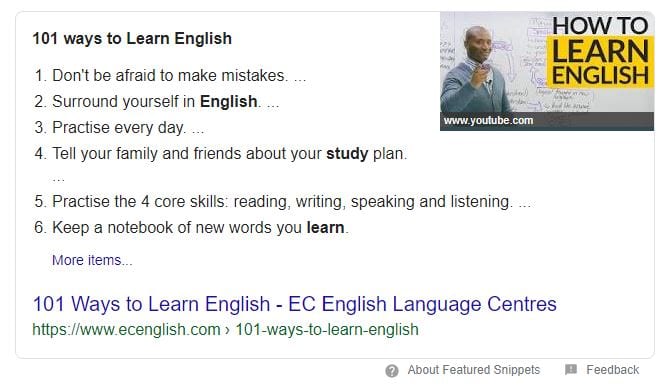The last quarter of 2019 saw some significant developments in search. The most important of them was the BERT update.
For websites whose majority of traffic comes from organic search, it is essential to upgrade their existing
If you do not upgrade your existing
Here are five great ways to refine your
1- Try to Rank Under Featured Snippets
A featured snippet is displayed at the top of the search results. They are aimed at providing a direct answer to the user query. For example, a query like “who is the father of the computer,” Google returns a direct answer in the form of a featured snippet.

Increasing the number of keywords on which your website ranks under featured snippets can help you increase both organic traffic and conversions.
A Search Engine Land case study suggests that acquiring a featured snippet for a website was able to increase sessions by over 500%.

You can find all such keywords where your competitors are ranking under featured snippets, but your website isn’t.
Tools like SEMrush lets you see all such queries that are sending traffic to your competitor’s site via featured snippets.
![]()
Prepare a list of such keywords and try to create a resource that is better than what your competitor is having. This way, you can start ranking under featured snippets for several queries.
2- Optimize for UX and the BERT Update
Every update that Google does to its core algorithm is related to optimize the user experience.
Even the latest BERT update focuses on understanding the intent behind a search query.
Here are some ways to optimize for UX and BERT:
- Get rid of broken links and duplicate pages on your site.
- Ensure each of the pages in your site is focused on single-user intent.
- Have a design that is consistent throughout the whole site.
- Make sure your website is mobile-friendly.
- Carefully optimize your Call-to-actions.
- Focus on engagement metrics like bounce rate and time on site. The time on site should be higher, while the bounce rate should be lower.
- Create video content to help the user understand what you are selling
3- Improve Site Speed
Site speed is one of the most significant factors that impact
Here are some ways to improve the speed of your website:
- Enable compression and minify CSS.
- Check your website on Page Speed Insights and implement the suggestions provided there.
- Reduce the number of redirects to your site.
- Use a CDN to improve the performance of your server. A CDN leverages intelligent caching that helps to bring your content closer to your website visitors.
- Fix all the broken links in your site and start using image sprites if you haven’t done so.
- Ensure your site is mobile-friendly, and it loads faster in mobile devices, as well.
- Use Ajax in your web pages as it allows you to load data without the need to refresh the page.
- Make use of accelerated mobile pages as this will increase the CTR of your website in the organic search results, which in turn will improve the engagement metrics and lead to higher conversions.
4- Leverage the Power of Videos
Videos are known to boost the online presence of businesses. They help to improve storytelling that aims to communicate everything to your audience in a seamless manner.
We can communicate around 1.8 million words in a 60-second long video.
Adding videos on your webpages improves the engagement metrics like bounce rate, time on page, and time on site.
Improvement in engagement metrics increases organic rankings, thereby leading to maximum organic traffic and conversions.
Videos are also a great way to rank under featured snippets. Google prefers to rank websites that feature videos, especially how “how-to” related searches, as shown below:

Videos result in a higher click-through rate and an improved backlink profile because people prefer linking to videos.
Videos help to boost local
5- Optimize For Question Keywords and Voice Search
Voice search will dominate in 2020. Optimizing your website for question keywords is one of the perfect ways to get your site ranked for voice search queries.
Voice searches mostly consist of longer and conversational phrases. Question keywords are divided into three types, namely:
- Direct answer questions (DAQ) – Here, the searcher intends to find an immediate answer to the question.
- Short answer questions (SAQ) – Here, the answer returned by Google contains a short paragraph.
- Long answer questions (LAQ) – Some answers returned by Google consists of several steps, including videos. LAQ keywords consist of such phrases.
In 2020, you need to optimize your website for all the three types of question keywords, as suggested above.
You can find question keywords with the help of tools like SEMrush and Answer The Public.
Once you have your list of question keywords ready, you need to prepare content that matches the intent of the user.
Present the content in an FAQ style, add videos and images wherever necessary, and don’t forget to add relevant schema markup.
The schema will help the search engines to understand the contents of your webpage in a better manner.
Last but not least, you can use the Performance report in Google Analytics to measure the performance of rich snippets in the search results.
Final Thoughts
Organic competition is only going to get tougher in 2020. Although the fundamentals of


